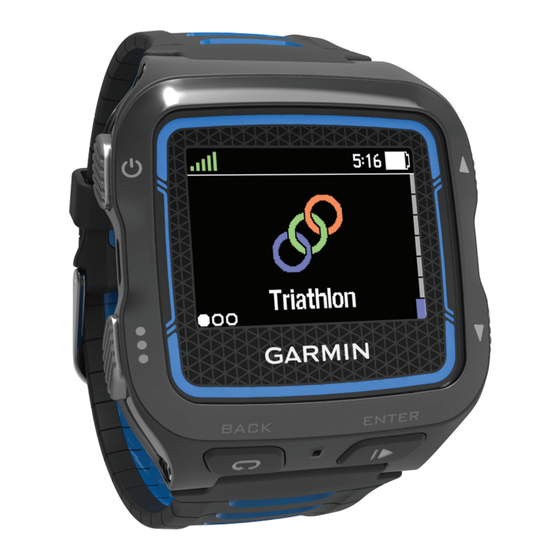Garmin Forerunner 920XT Kullanıcı El Kitabı - Sayfa 18
İzle Garmin Forerunner 920XT için çevrimiçi göz atın veya pdf Kullanıcı El Kitabı indirin. Garmin Forerunner 920XT 28 sayfaları.
Ayrıca Garmin Forerunner 920XT için: Kullanıcı El Kitabı (24 sayfalar)

Duplicate profile names include a number, for example:
Triathlon(2).
5
Select an option:
• Select Use Default to create your custom profile starting
from the system default settings.
• Select a copy of an existing profile to create your custom
profile starting from one of your saved profiles.
NOTE: If you are creating a custom multisport profile, you are
prompted to select two or more profiles and include
transitions.
6
Select an option:
• Select Edit Settings to customize specific profile settings.
• Select Done to save and use the custom profile.
Deleting an Activity Profile
1
Select
> Settings > Activity Profiles.
2
Select a profile.
NOTE: You cannot delete the active profile, and you cannot
delete a single sport profile that is contained within the active
multisport profile.
3
Select Remove Profile > Yes.
Activity Settings
These settings allow you to customize your device based on
your training needs. For example, you can customize data
screens and enable alerts and training features.
Customizing the Data Screens
You can customize data screens based on your training goals or
optional accessories. For example, you can customize one of
the data screens to display your lap pace or heart rate zone.
1
Select
> Activity Settings > Data Screens.
2
Select a screen.
3
If necessary, select Status > On to enable the data screen.
4
If necessary, edit the number of data fields.
5
Select a data field to change it.
Adding the Clock
You can add the clock to the data screens loop for an activity
profile.
1
Select an activity profile.
2
Select
> Activity Settings > Data Screens > Clock > On.
Alerts
You can use alerts to train toward specific heart rate, pace, time,
distance, cadence, and calories goals and to set run/walk time
intervals.
Setting Range Alerts
A range alert notifies you when the device is above or below a
specified range of values. For example, if you have an optional
heart rate monitor, you can set the device to alert you when your
heart rate is below zone 2 and over zone 5
Rate Zones, page
10).
1
Select
> Activity Settings > Alerts > Add New.
2
Select the type of alert.
Depending on your accessories and the activity profile, the
alerts may include heart rate, pace, speed, cadence, and
power.
3
If necessary, turn on the alert.
4
Select a zone or enter a value for each alert.
Each time you exceed or drop below the specified range, a
message appears. The device also beeps or vibrates if audible
tones are turned on
(Setting the Device Sounds, page
14
Setting a Recurring Alert
A recurring alert notifies you each time the device records a
specified value or interval. For example, you can set the device
to alert you every 30 minutes.
1
2
3
Each time you reach the alert value, a message appears. The
device also beeps or vibrates if audible tones are turned on
(Setting the Device Sounds, page
Setting Walk Break Alerts
Some running programs use timed walking breaks at regular
intervals. For example, during a long training run, you can set
the device to alert you to run for 4 minutes, and then walk for 1
minute, and repeat. You can use the Auto Lap
using the run/walk alerts.
NOTE: Walk break alerts are available only for running profiles.
1
2
3
4
Each time you reach the alert value, a message appears. The
device also beeps or vibrates if audible tones are turned on
(Setting the Device Sounds, page
Editing an Alert
1
2
3
Running with the Metronome
The metronome feature plays tones at a steady rhythm to help
you improve your performance by training at a faster, slower, or
more consistent cadence.
NOTE: The metronome is not available for cycling or swimming
profiles.
1
2
3
4
5
(Setting Your Heart
6
7
8
Using Auto Pause
You can use the Auto Pause feature to pause the timer
automatically when you stop moving or when your pace or
speed drops below a specified value. This feature is helpful if
your activity includes stop lights or other places where you need
to slow down or stop.
16).
NOTE: History is not recorded while the timer is stopped or
paused.
Select
> Activity Settings > Alerts > Add New.
Select an option:
• Select Custom, select a message, and select an alert
type.
• Select Time, Distance, or Calories.
Enter a value.
Select
> Activity Settings > Alerts > Add New.
Select Run/Walk.
Enter a time for the run interval.
Enter a time for the walk interval.
Select
> Activity Settings > Alerts.
Select an alert.
Edit the alert values or settings.
Select
> Activity Settings > Metronome > Status > On.
Select an option:
• Select Beats Per Minute to enter a value based on the
cadence you want to maintain.
• Select Alert Frequency to customize the frequency of the
beats.
• Select Sounds to customize the metronome sound.
If necessary, select Preview to listen to the metronome
feature before you run.
Select BACK to return to the timer screen.
Select
to start the timer.
Go for a run.
The metronome starts automatically.
During your run, select
to view the metronome screen.
If necessary, hold
to change the metronome settings.
®
16).
feature while
®
16).
Customizing Your Device
